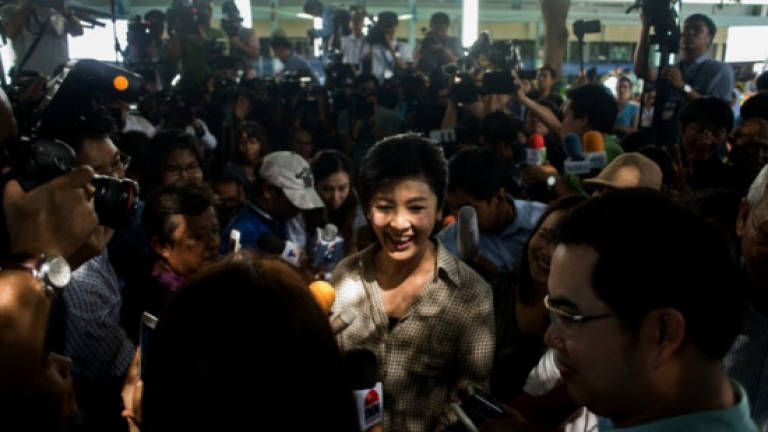Thai junta poll win sends country 'backwards': Ex-PM

BANGKOK: A referendum victory for Thailand's ruling generals over a new constitution is a "backwards" step for the country, the toppled ex-premier said Monday as the democracy movement reels from its first poll defeat in a decade.
The bitterly divided kingdom has been ruled by a junta for two years since Yingluck Shinawatra's government was booted from office.
The majority "yes" vote in support of the charter was the first test of public opinion since the 2014 coup, although independent campaigning and open debate was stifled ahead of the polls.
The draft was heavily criticised in the poll run-up for clauses that embed military power and straitjacket the role of elected officials.
But Sunday's vote lends legitimacy to a junta that says it alone can stabilise Thailand and detoxify politics after a decade of turmoil.
Unofficial results released by the Election Commission showed 61.4% of the country backed the document, with 38.6% voting "no".
At under 55% turnout was modest.
But it was enough to land a hammer blow on the nation's pro-democracy movement, which since 2006 has been winded by two coups, court rulings and a bloody military crackdown.
"I accept the decision of the people," Yingluck said in a social media post, in her first reaction to Sunday's poll, adding she was "not surprised" at the result due to the bar on debating the document.
"I am saddened by the fact that our country is going backwards to an undemocratic constitution," she added.
Military ascendancy
Sunday marked her family's first loss at the polls since a charter referendum in the wake of a 2006 coup that toppled Thaksin Shinawatra – Yingluck's billionaire elder brother who sits at the crux of Thailand's political schism.
The Shinawatra clan have won all general elections since 2001, scooping up votes by promising greater wealth and opportunity to the nation's poor, especially in the long neglected north and northeast.
Yingluck's pro-democracy Peau Thai party had been widely assumed to still enjoy mass support and maintain the power to mobilise their voters.
But initial results from the northeast showed only a narrow majority in support of the party position, with the "no" vote squeaking by with 51%.
Experts said the vote in part reflected the impact of the junta's ban on campaigning.
But it was a sign of a population wearied by a cycle of coups and bloody protests that have defined Thailand's "lost decade" of political conflict.
Anxiety over the ill health of 88-year-old King Bhumibol Adulyadej has compounded the crisis.
His reign has seen five tumultuous decades with powerful elites now jostling for position ahead of the eventual transition.
Democracy is on the back-burner throughout this period, according to Thitinan Pongsudhirak, a politics expert at Chulalongkorn University.
"There is an implicit understanding of the military being a midwife to a transition. This is why people cut them some slack," he said.
Down, but not out
The military says the new constitution will end endemic political corruption and pave the way for a general election next year.
But critics say it will instead introduce a tightly controlled partial democracy under the stewardship of the military and its royalist allies.
Once formally adopted, the charter will allow for a junta-appointed senate – including six seats reserved for military commanders.
The upper house will keep elected lawmakers in check, while courts and other watchdog bodies will be given increased powers – despite already being accused of political bias.
Another clause makes it easy to begin impeachment proceedings, while a new proportional representation voting system is likely to produce weak coalition governments.
That will likely chisel away at the Shinawatra's electoral success – a grassroots base which is now under scrutiny following the referendum.
"It seems that right now people trust the military more than politicians," Thida Thavornseth, an advisor to the pro-democracy "Red Shirt" movement told AFP.
"We were almost a democratic country, but we can't keep power. This is a big blow, but we will never surrender." — AFP